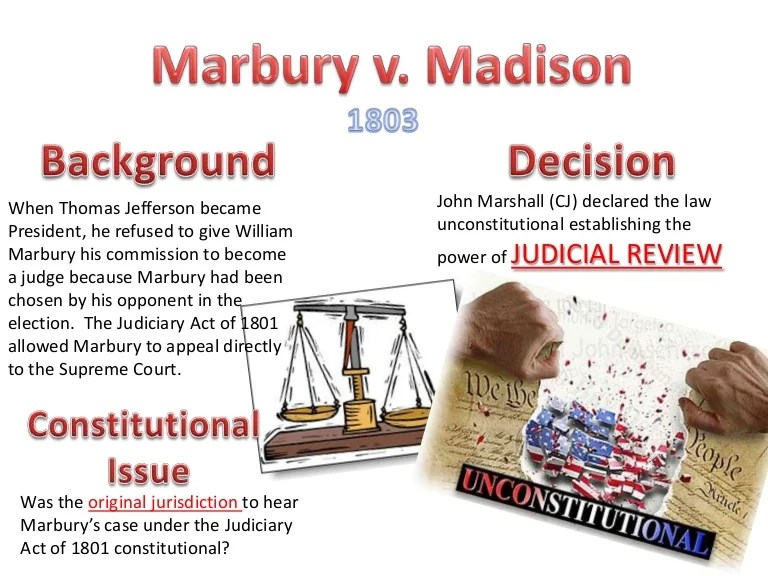The landmark case of Marbury v. Madison, decided in 1803, holds a pivotal place in the annals of American law. This Supreme Court decision established the principle of judicial review, allowing the judiciary to invalidate laws and executive actions that are deemed unconstitutional. At its core, the case underscored the importance of the rule of law and the checks and balances inherent in the U.S. government system. The judicial review principle set forth in this case empowered the Supreme Court to act as a guardian of the Constitution, ensuring that no branch of government could exceed its authority. The implications of the ruling have reverberated through American history, shaping the relationship between the branches of government and influencing countless decisions that followed.
In Marbury v. Madison, the court's decision served as a critical affirmation of the judiciary's role within the federal government. The case arose from a political conflict during the transition of power between President John Adams and President Thomas Jefferson. Adams, a Federalist, made several last-minute appointments, including William Marbury as a Justice of the Peace. However, when Jefferson took office, his Secretary of State, James Madison, refused to deliver Marbury’s commission. This refusal led to the legal dispute that would ultimately define the boundaries of judicial authority.
As we delve deeper into the details of Marbury v. Madison, it becomes essential to analyze the court's decision and its implications. What were the main arguments presented in court? What was the court's reasoning behind its ruling? How did this case influence future legal interpretations? By exploring these questions, we can better understand the significance of the court's decision in Marbury v. Madison and its lasting impact on American jurisprudence.
What Led to the Marbury v. Madison Case?
The origins of the Marbury v. Madison case can be traced back to the political tensions of the early 19th century. After the election of 1800, a shift occurred in the political landscape, with the Democratic-Republican Party, led by Jefferson, taking control of the presidency and Congress. This transition was not without conflict, particularly regarding the last-minute appointments made by outgoing President Adams.
Who Was William Marbury?
William Marbury was a prominent Federalist politician who was appointed as a Justice of the Peace in the District of Columbia by President John Adams. His appointment was part of a larger strategy by Adams to maintain Federalist influence in the government despite the Democratic-Republican victory. Marbury's commission remained undelivered when Jefferson took office, leading to his legal battle against Madison.
What Were the Key Legal Questions in Marbury v. Madison?
The case raised several crucial legal questions, including:
- Did Marbury have a right to his commission?
- Could he sue for its delivery?
- Was the Supreme Court the appropriate venue for such a lawsuit?
- Was the law under which Marbury sought relief constitutional?
What Was the Court's Decision in Marbury v. Madison?
The Supreme Court, led by Chief Justice John Marshall, ultimately ruled in favor of Marbury. The court held that Marbury had a right to his commission, and it was the duty of the government to deliver it. However, the court also found that it could not grant Marbury the relief he sought because the portion of the Judiciary Act of 1789 that allowed him to bring his claim to the Supreme Court was unconstitutional.
What Did the Ruling Mean for Judicial Review?
The ruling in Marbury v. Madison effectively established the principle of judicial review, allowing the Supreme Court to strike down laws that conflict with the Constitution. This decision firmly positioned the judiciary as a co-equal branch of government, with the authority to interpret the law and ensure that it aligns with constitutional principles.
How Has Marbury v. Madison Influenced Future Court Cases?
The principles established in Marbury v. Madison have had a profound impact on American law and governance. Subsequent Supreme Court cases have relied on the precedent set in Marbury, reinforcing the judiciary's role in checking the powers of the legislative and executive branches. Notable cases influenced by Marbury include:
- Brown v. Board of Education (1954) - Addressing racial segregation in schools.
- Roe v. Wade (1973) - Establishing a woman's right to choose regarding abortion.
- United States v. Nixon (1974) - Reinforcing the principle that no one is above the law.
What Are the Broader Implications of the Decision?
The implications of the Marbury v. Madison decision extend beyond its immediate legal context. By asserting the power of judicial review, the case has influenced democratic governance and the rule of law in the United States. It has ensured that the Constitution remains the supreme law of the land, providing a framework for justice and equality.
How Is Marbury v. Madison Viewed Today?
Today, Marbury v. Madison is regarded as a cornerstone of American constitutional law. Its legacy is celebrated in legal circles, and it continues to be taught in law schools across the country. The case serves as a reminder of the importance of an independent judiciary and the critical role it plays in maintaining the balance of power among the branches of government.
Conclusion: The Enduring Legacy of Marbury v. Madison
In conclusion, the court's decision in Marbury v. Madison set a powerful precedent that has shaped the American legal landscape. The ruling affirmed the judiciary's role in safeguarding the Constitution and ensuring that all government actions are subject to its scrutiny. As we reflect on this landmark case, it is clear that its impact continues to be felt today, reinforcing the principle that the rule of law is paramount in a democratic society.


